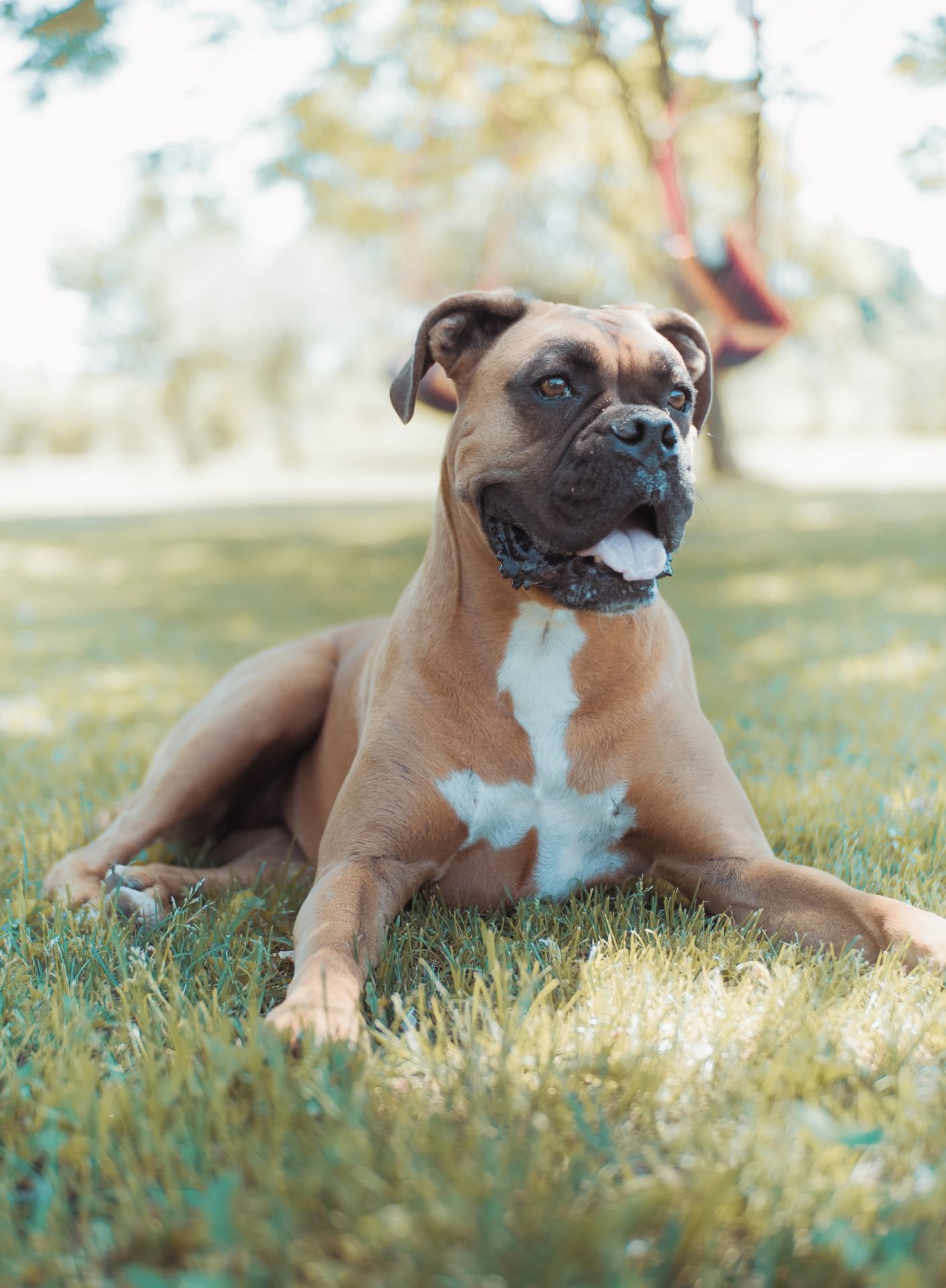Boxer

The Boxer is a dog breed renowned the world over for being a jack of all trades, and master of many. These loyal working dogs move like the athletes for which they’re named, and have the confidence and dignity of champions.
Boxers aren’t just bred for work, they also love to play and are frequently the life of the party. They’ve got rugged good looks and a sense of humour that has endeared them to dog lovers for hundreds, if not thousands of years.
Temperament
Boxers approach life with a playfulness and exuberance that is a stark contrast to their rough, square-jawed appearance. Boxers are perpetually happy to be doing anything – whether it’s tasks assigned to them for work, or spending time with their human companions. The typical Boxer is a highly intelligent, alert, and loyal animal, prone to clownishness and playfulness. They make great family dogs when their owners are able to give them the attention and training that they need. Boxers require a significant amount of mental stimulation and socialization to reach their full potential. Boxers are not inherently aggressive, though they can be protective when they are trained as guardians. They’re often gentle with children under their care, though they require early training to learn how to play with kids. Even then, their size and strength mean they should always be supervised when interacting with young children. Their high intelligence means that they get bored easily, and they need a lot of time and training with their owners to really thrive.The Ultimate Guide to Boxer
Origins
The origins of the Boxer date back to the late 1800s in Germany, with the large hunting breed called the Bullenbeisser. It is thought that the Boxer was an attempt at creating a smaller version of the Bullenbeisser, which was originally used to hunt large game. However, there are those who trace the Boxer lineage even further back to Assyrian war hounds in 2500 B.C. However, the modern Boxer came to prominence once boar hunts and other lavish displays of royal excess went out of fashion. This sleeker, more streamlined dog was reminiscent of the powerful hunting dogs, but far more versatile. Boxers have been used in all sorts of roles since then, finding success as guide dogs, guard dogs, hunting dogs, and more. Today, the Boxer is one of the top 10 dog breeds in America, and it doesn’t look like its popularity will wane anytime soon.
Key Characteristics of Boxer
| Boxer | Boxers approach life with a playfulness and exuberance that is a stark contrast to their rough, square-jawed appearance. Boxers are perpetually happy to be doing anything – whether it’s tasks assigned to them for work, or spending time with their human companions.
The typical Boxer is a highly intelligent, alert, and loyal animal, prone to clownishness and playfulness. They make great family dogs when their owners are able to give them the attention and training that they need. Boxers require a significant amount of mental stimulation and socialization to reach their full potential.
Boxers are not inherently aggressive, though they can be protective when they are trained as guardians. They’re often gentle with children under their care, though they require early training to learn how to play with kids. Even then, their size and strength mean they should always be supervised when interacting with young children.
Their high intelligence means that they get bored easily, and they need a lot of time and training with their owners to really thrive. |
| Exercise Needs | In general, Boxers are highly active dogs that want lots of exercise and play throughout the day. However, there are some precautions that need to be taken due to the Boxer’s specific needs.
Boxers have a shorter snout than most other dogs of their size and energy level, so they cannot be allowed to get too hot because their panting does not cool them down as effectively as other dogs.
Boxers are athletic animals and love to jump, especially when they’re young. A high fence is necessary to keep them from running off to chase smaller animals, or a sturdy leash if they’re being brought out of the house for a walk.
Giving your Boxer the amount of exercise they need will result in a calmer, more biddable dog. |
| Boxer Grooming | Boxers are relatively low-maintenance dogs due to their short coat and moderate shedding. A weekly brushing using a curry brush is usually enough for most Boxers, and will help to keep their shedding light.
They enjoy grooming themselves in an almost catlike fashion, and are often clean without needing baths. Because their coat is short, their skin needs to be in top condition to protect them from the elements. If you do bathe your Boxer, use a gentle dog-specific shampoo to avoid drying out their skin.
The Boxer’s nails should be trimmed once a month if they are not worn down naturally. Brushing your Boxer’s teeth should be done daily if possible, to prevent tooth and gum disease. |
| Boxer Training | While they’re suited to a wide variety of working roles, training is important even for Boxers that are kept as pets. Their high intelligence means they require varied and interesting training, otherwise they may get bored. A Boxer is smart enough to make up their own games if they feel they aren’t getting enough mental stimulation, which may result in unwanted behaviors.
Despite this, Boxers pick up training quickly, so you may run out of tasks for them before they get bored. They excel in agility and obedience, so training your Boxer for these sports, even if you do not intend to compete, may provide them with the required mental challenge.
Some Boxers may have an independent streak that can make them uncooperative when they’re not in the mood for training. Positive reinforcement will go a long way toward motivating them to follow your cues. |
| Boxer Lifespan and Health Issues | Boxers have an average lifespan for dogs of their size, with a life expectancy of 10 to 12 years. Boxers may be prone to:
|
| Boxer Size And Space Requirements | Boxers are brawny dogs with a love of both work and play. Their heights range from 23 to 25 inches at the shoulder for males, while females are around 21 to 23 inches in height. Males weigh between 60 to 80 pounds, and females are around 50 to 65 pounds.
Their active nature means that they need quite a bit of space to live and play. An enclosed outdoor area with a high fence is a good option for most Boxers, as they love to jump and some can scale walls with ease.
Boxers will need at least an hour of exercise a day, either in the form of brisk walking or outdoor play. Joggers and runners can take their Boxer along, so long as they keep the sessions short enough that the dog does not overheat.
One specific trait of Boxers that has to be mentioned is their speed – they’re one of the fastest dog breeds, reaching 30 mph for some specimens. If you’re going to be taking your Boxer for a run, you’ll need to keep them on a leash or else risk being left in their dust. |
Other considerations:
- Boxers are prone to drooling and snoring due to the structure of their snout and lips. Earplugs at night may be necessary if you keep your Boxer with you in the bedroom.
- Boxers do not do well as outdoor dogs due to their short coat, which does not protect them from the elements.
- Like Golden Retrievers, Boxers seem to mature slowly and retain their puppy-like playfulness well into the third year of life.
How can I take good care of my Boxer or Puppy?
Proper socialization
Boxers tend to be muscular and powerful, so their play may be too rough for others even when they think they’re being gentle. Socializing your Boxer puppy is crucial during the 8 to 12 week period so that they learn proper behaviors. A gentle and calm adult Boxer begins with this early socialization and exposure to new experiences.
Proper nutrition
Boxers are large, well-built dogs with tons of muscle, so it’s important to get them high-quality, premium dog food. This ensures that your Boxer puppy gets the proper ratio of nutrients to grow properly. Adult Boxers may benefit from a slow feeder or puzzle feeder so that they don’t eat too quickly, which is one of the causes of GDV or bloat. You may also consult with your veterinarian as they will be able to make more specific recommendations regarding your dog’s nutritional needs.
Up-to-date vaccinations
Upon taking home your Boxer puppy, you should ask your veterinarian for a vaccination schedule and follow it to the best of your ability. Vaccination schedules will vary depending on the prevalence of common transmissible dog diseases in your area.
Most Asked Boxer Questions
-
+How Much do Boxer Puppies Cost
